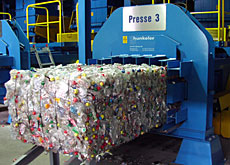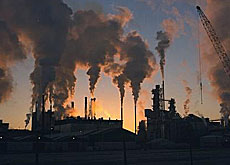Swiss go recycling mad

Switzerland is the world champion in the recycling of plastic bottles, with 80 per cent returned to factories after use.
The high recycling rate can be partly explained by the fact that the Swiss are an ecologically-minded nation, as well as the large number of high-tech recycling plants.
Switzerland far outstrips its neighbours in plastic bottle recycling – the European average is between 20 and 40 per cent – making the country the world leader in this area.
It is estimated that each Swiss recycles on average 100 plastic bottles a year at one of over 15,000 recycling points.
The bottles are made of a substance known as PET (polyethylene terephthalate), which is widely used for soft drinks and mineral water, as well as increasingly for fruit juices, beer and oil.
It has proved so popular that eight out of every ten drinks uses PET as packaging. It is also generally acknowledged to be lighter and more ecological than PVC or cans.
National pastime
The recycling of PET bottles seems to have become a national pastime.
“Since the bottle deposit was stopped two years ago, the Swiss have kept on faithfully bringing bottles to the recycling points,” observes Gilles Oberson, the head of Seba Aproz, a company that produces mineral water and soft drinks for Switzerland’s largest supermarket, Migros.
One reason why the Swiss are such avid recyclers is the rubbish bag tax, which applies in most areas of the country.
The tax obliges people to put yellow stickers on the bags – for which they have to pay – before their rubbish can be collected.
This means that people are only too happy to separate recyclable items from their rubbish, including glass and paper as well as plastic, in order to save money.
“At the beginning, consumers were mostly attracted to PET because it was light and unbreakable and also for financial reasons. But with the passage of time, a phenomenon of ecological consciousness and civic responsibility has developed,” Oberson told swissinfo.
All this is good news for the government, which requires a 75 per cent threshold for such recycling for it to be ecologically sustainable. To finance the recycling process the government has imposed a tax of four centimes on bottles sold.
Advances
PET has also led the way in a new era of synthetic material recycling. The substance – derived from petrol – can be totally recycled, unlike some other plastics, and at low cost.
Technological advances at sorting centres which prepare the PET for recycling have led to an increase in the amount of recycling that can be carried out.
The recycled product is not only used to make carpets and textiles but also to make more bottles.
“Switzerland was one of the first countries to develop the technology to recycle 100 per cent of the used material,” said Patrik Geisselhardt, head of Redilo, a start-up that specialises in finding new markets abroad for Switzerland’s PET know-how.
With many countries looking for solutions to eliminate their mountains of PET bottles, the company’s future looks good.
Swiss companies are already involved in consulting or promoting their technologies in several European countries, including Italy and the Netherlands.
Redilo is also looking further afield at Costa Rica and Tunisia, where tourists have left tons of PET bottles scattered on the beaches.
swissinfo, Armando Mombelli and Isobel Johnson
80 per cent of PET bottles are recycled in Switzerland.
There are 15,000 recycling points in the country,
PET was used in the Second World War to make textiles, parachutes and polyester.
From the early 1990s onwards PET has dominated the mineral water and soft drinks market and eight out of ten bottles are now made of it.

In compliance with the JTI standards
More: SWI swissinfo.ch certified by the Journalism Trust Initiative



You can find an overview of ongoing debates with our journalists here. Please join us!
If you want to start a conversation about a topic raised in this article or want to report factual errors, email us at english@swissinfo.ch.